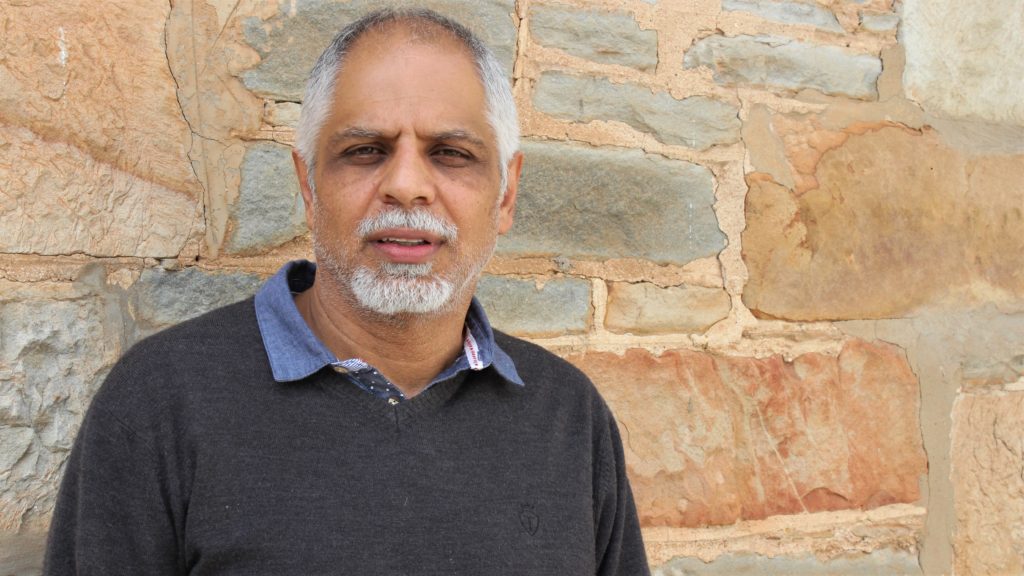By JULIAN JACOBS
As of Wednesday 24 June, the Makana municipal area had 98 active coronavirus cases, with 138 total cases and 39 recoveries. Of this figure, Makhanda has the highest number of infections, with 95 active cases and 36 recoveries to date.
Mohamed Docrat, the Chief Pharmacist in the Department of Health’s Makana Subdistrict, is currently its acting head and represents the Department on the Makana Covid-19 Joint Operations Committee.
He is concerned that the community should act with care and take responsibility for their actions when they venture outside their homes.
In his Beaufort Street office, Docrat’s phone rings constantly, as more and more new Covid-19 cases are reported.
As I wait outside his office, he is busy giving orders to a nursing supervisor.
Already she has four cases that she must investigate. One is at a local school, where one of the teachers has Coronavirus symptoms. The school is under pressure from the unions to close it and the nursing supervisor must assess the situation. As she leaves, another call comes in.
A Covid-19 patient is waiting to be picked up from Bathurst. Docrat calls the ambulance driver and the nursing supervisor for that area and the ball is rolling.
Since the weekend there have been 67 new active cases. By the time I reach his office at 2pm on Monday, 10 more active cases have been added. By Wednesday there are 95 active cases.
I ask him what he’d like residents to know.
“We are trying to reach only the people who have had close contact with a known Covid-19 person,” Docrat says. “In other words, we are only testing people who have symptoms and have come into contact with a known positive case. And by close contact we mean, that any person who was within 1.5 metres of the positive person, or spent more than 15 minutes with said positive person.”
Many people were insisting on being tested if one person within their workplace or at home had tested positive.
“This is not the case,” Docrat says.
What should happen if a person tests positive?
“The patient will be informed. The patient will receive counselling on how to self isolate and to manage that situation. If a patient can’t self isolate at home, we would provide a space for the person; however, beds are already being taken up fast,” Docrat said.
The official time to self-isolate is normally 14 days, “but taken into consideration must be the time you were exposed to someone who was positive,” Docrat says.
Once you’re in isolation, it’s only if you show symptoms that you’ll be tested.
“There is a form that you need to complete on a daily basis to track your symptoms.”
He urges residents and workers to not fake symptoms, to not state they’ve been in close contact with someone in order to get tested unnecessarily, which has been the case over the past month.
“The Makana Health subdistrict office has devised a plan to cater for all the regions in our district in the response to the Coronavirus,” Docrat says. “Our staff are ready to assist, but we need everyone’s help to fight this battle.”
Along with the Makana Covid-19 Joint Operating Committee, Docrat urges residents to stay safe as Coronavirus numbers rapidly climb in our area.
“Stay at home when you are not at work or at school. Stop socialising or visiting friends just because the lockdown levels are lifted,” Docrat says.
“Stay at home also means not going to Bathurst, Port Elizabeth, King William’s Town or East London.
“And if you are at work, avoid canteens and tearooms and lunches without masks. Employers must ensure that they minimize risks and that all staff must undergo Covid-19 training.”
Seven schools in the Makana municipal area have reported cases of Covid-19 among learners and teachers since schools have reopened. Some have been urged to close. Others have remained open, having undergone the correct protocols to clean and sanitise them. Several other workplaces have become hotspots and the same deep-cleaning and sanitising has taken place.
Over the next few weeks and days, along with other members of the Makana JOC, I will be out in the community, encouraging everyone to play their part in slowing the spread of the virus in our communities. The JOC indicated that ward councillors will play a bigger role in this initiative.
We know that the Coronavirus affects all of us. It infects the rich and the poor, the young and the old, black and white, those who live in the cities and those in the villages. And stigma keeps us from defeating it.
- Julian Jacobs is the communications officer for the Makana Covid-19 Joint Operating Committee and this article is written in that capacity.


